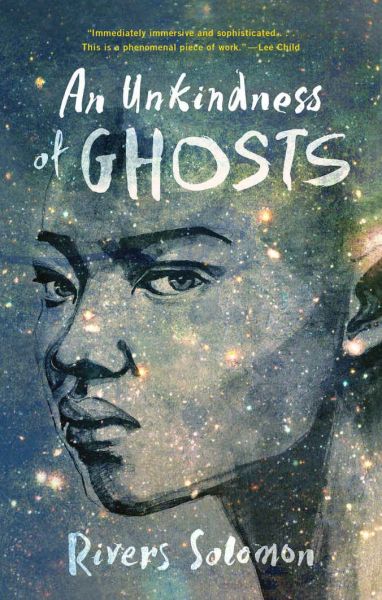Sole Misfortune
An Unkindness of Ghosts
By Rivers Solomon

6 Sep, 2018
Rivers Solomon’s 2017 An Unkindness of Ghosts is a generation-ship novel.
The generation ship Matilda set out lifetimes ago to convey a handful of people to a distant promised land1. It carries within it every flaw known to human society. Until the ship arrives at its destination, there is no escape, not for the ship’s rulers (the Sovereignty) and not for the unfortunates relegated to the lower decks.
Aster is brilliant. Her intellectual gifts recommend her to the great surgeon Theo — not as a potential surgeon, but as a surgeon’s assistant. That is all she can ever be, because her skin is brown. That marks her as one of the underclass, as someone who can be oppressed and victimized without consequence.
Aster uses her medical training to make life less unbearable for her fellow slaves. Material and energy shortages (engineered by the ruling class to punish the lower decks) limit the effectiveness of her treatments, but Aster does her best.
Aster’s mother vanished a quarter of a century ago. She is generally believed to have killed herself to escape life under the Sovereignty. But she left behind journals that tell a different story to those who know how to read them. Aster does not; she is blind to the possibility that the journals are written to be read as metaphor, not fact. When this is pointed out to her, Aster realizes she has entirely misread the journals. There is a mystery behind her mother’s disappearance.
Aster may not have time to unravel the mystery. The current Sovereign is dying. His heir apparent is the oddly named Lieutenant, who is known for malice and cruelty. He is convinced that the dark-skinned peoples of the lower decks are the embodiment of sin and licentiousness. He will rule with an iron hand, a hand even weightier than that of the current Sovereign.
~oOo~
One oddity: the ad copy refers to the lower decks as sharecroppers. I think the more suitable term is “slave.”
Main criticism: Aster’s ultimate fate comes out of left field, unjustified by what has gone before, even granting that the people running the ship are a bunch of bigoted, vicious bullies who don’t really understand the machinery on which the Matilda’s population depends.
Otherwise…
Some readers may find the society of the Matilda too bleak and depressing to be plausible. It is a sad fact that there’s no vice or abuse in this book for which real world analogs do not exist. All one has to do to see people like the Sovereignty’s guards and ruling classes is to turn on the six o’clock news. Religious fanaticism, racism, and misogyny all intersect to victimize most of the passengers on the Matilda. Even the upper classes are anxiously aware of the misery and discontent that sustain their luxurious lives. Autocrats live in fear of rebellion.
The Sovereignty attempts to remain in control by isolating the classes and pitting the various lower-class groups (of different races, cultures, and languages) against each other. Lower-class cultures and languages differ. When appearance does not betray lower-class background, speech will.
What keeps the guards in line? They are allowed to abuse the lower deck population as the whim takes them. This keeps the slaves terrorized and subservient.
Intersexed persons are frequently found on the lower decks. The rulers believe that this is yet one more symptom of the genetic deficiencies and disordered lives of the underclass. The upper decks harbour a similar range of phenotypes, but this is not publicly revealed or acknowledged.
There is, of course, no evidence that the lower decks really are inferior, other than lacking the military, economic, and political power to resist enslavement. Indeed, the book gives the impression that the upper classes have risen to their level of incompetence, while the lower classes have stayed sharp.
Aster, being lower deck, possibly autistic, definitely intersexed, and of sufficient utility to the Surgeon that she attracts too much attention from powerful people, finds herself in an unenviable situation: she is too useful to kill out of hand, but possessed of an ample supply of friends, loved ones, and helpless bystanders who serve as hostages for her good behavior2.
I did not enjoy this novel so much as read it with compulsive page-turning horror. Who would enjoy 349 pages of abuse and murder? The book is, however, engaging. It is the author’s debut novel and a remarkable debut it is. No wonder that it was nominated for the Lambda Award, and made the 2017 Tiptree Honor List.
An Unkindness of Ghosts is available here (Amazon) and here (Chapters-Indigo).
1: It’s not clear what sort of calamity on Earth the Matilda is fleeing. Little Earthly history seems to have been preserved. However, nothing in the book specifically rules out “We refuse to live on an Earth where white people are not allowed to treat black people, queer people, and women like shit” as the motivation for the flight.
2: Bear in mind that “existing” could be taken as a crime.
